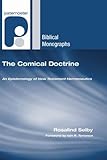
In her Comical Doctrine: An Epistemology of New Testament Hermeneutics (Paternoster, 2006), Rosalind Selby has several insightful observations. Summarizing the thought of Karl-Otto Apel, Selby comments:
Apel himself proposes a dialectical mediation of objective-scientistic and hermeneutical methods with a critique of ideology. Philosophical hermeneutics is reflexive in as much as the subject must self-objectify in order to be self-critical and avoid any hidden prejudices. ( 36)
Or, at least to avoid them as much as possible. Slightly later, Selby also reflects:
Does not the very Cogito [of Descartes] itself, far from establishing as a logical priority the existence of the doubter-who-doubts rather point in another direction? The very notion of an “I” presupposes a “not-I” over against which to define itself. But, much more than that, the very possibility of expressing cogito ergo sum depends upon the existence of, and participation in, a community of language users—teachers and preservers—who first gave the lonely thinker the linguistic tools with which to conceptualize and articulate solipsism. ( 37)
That such linguistic tools are strictly necessary to conceptualize solipsism is perhaps debatable (thought can happen independently of what is identifiable as language). Nevertheless, Descartes’ category of “self” as it plays out in his Cogito is certainly not one he has brought to the Cogito apart from influences from the “not-I” social community.